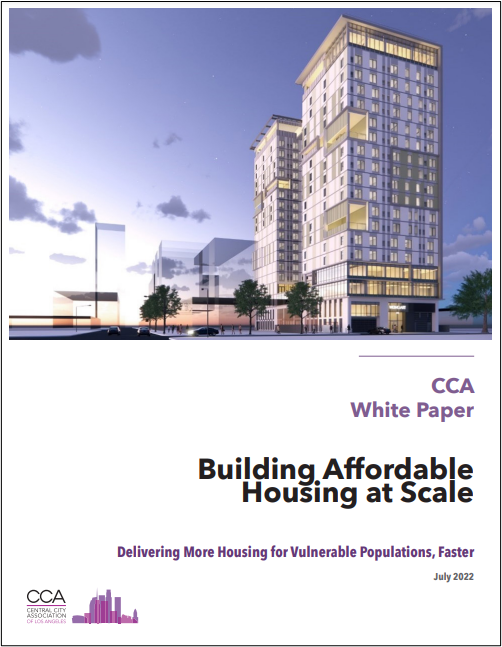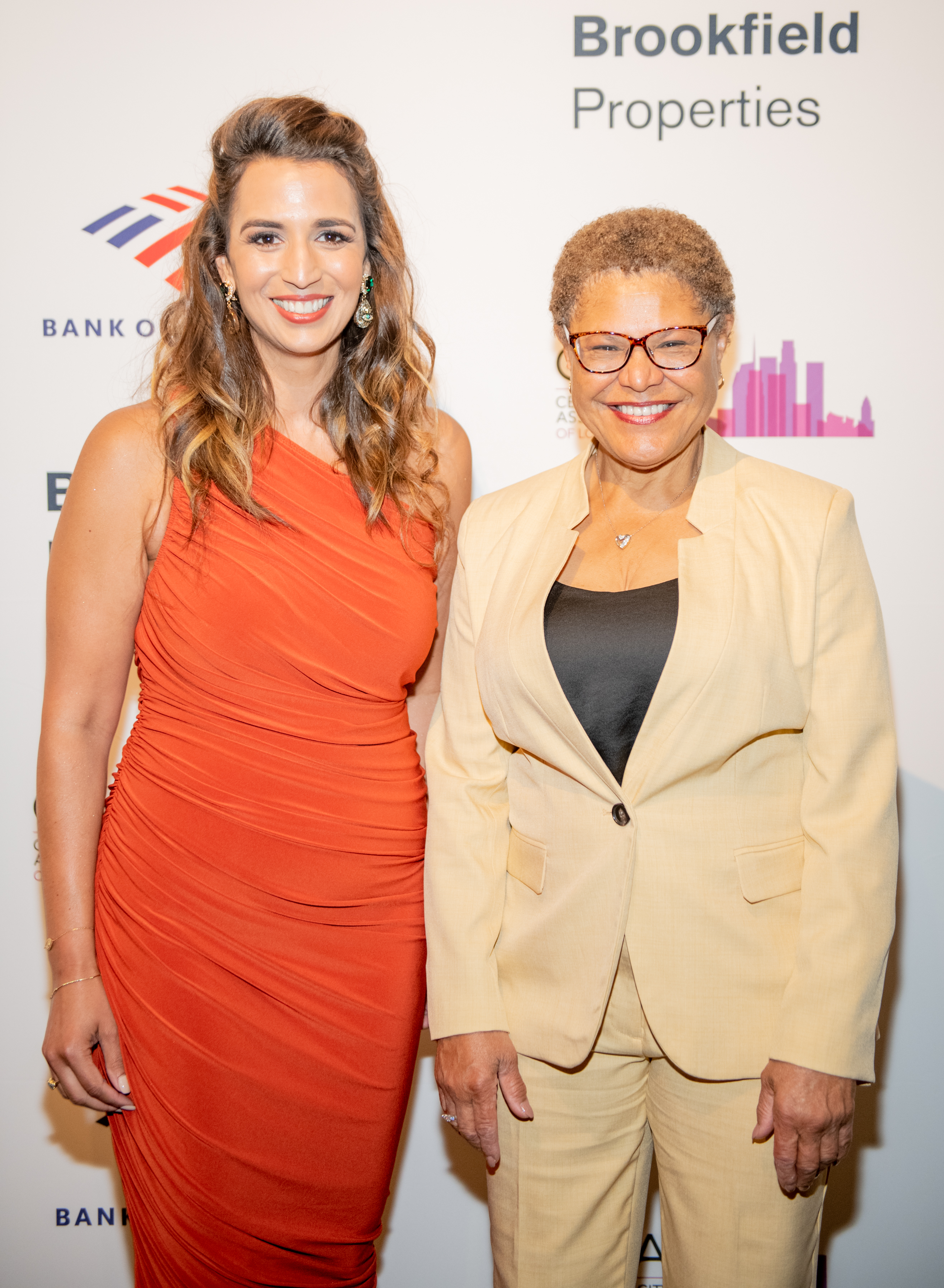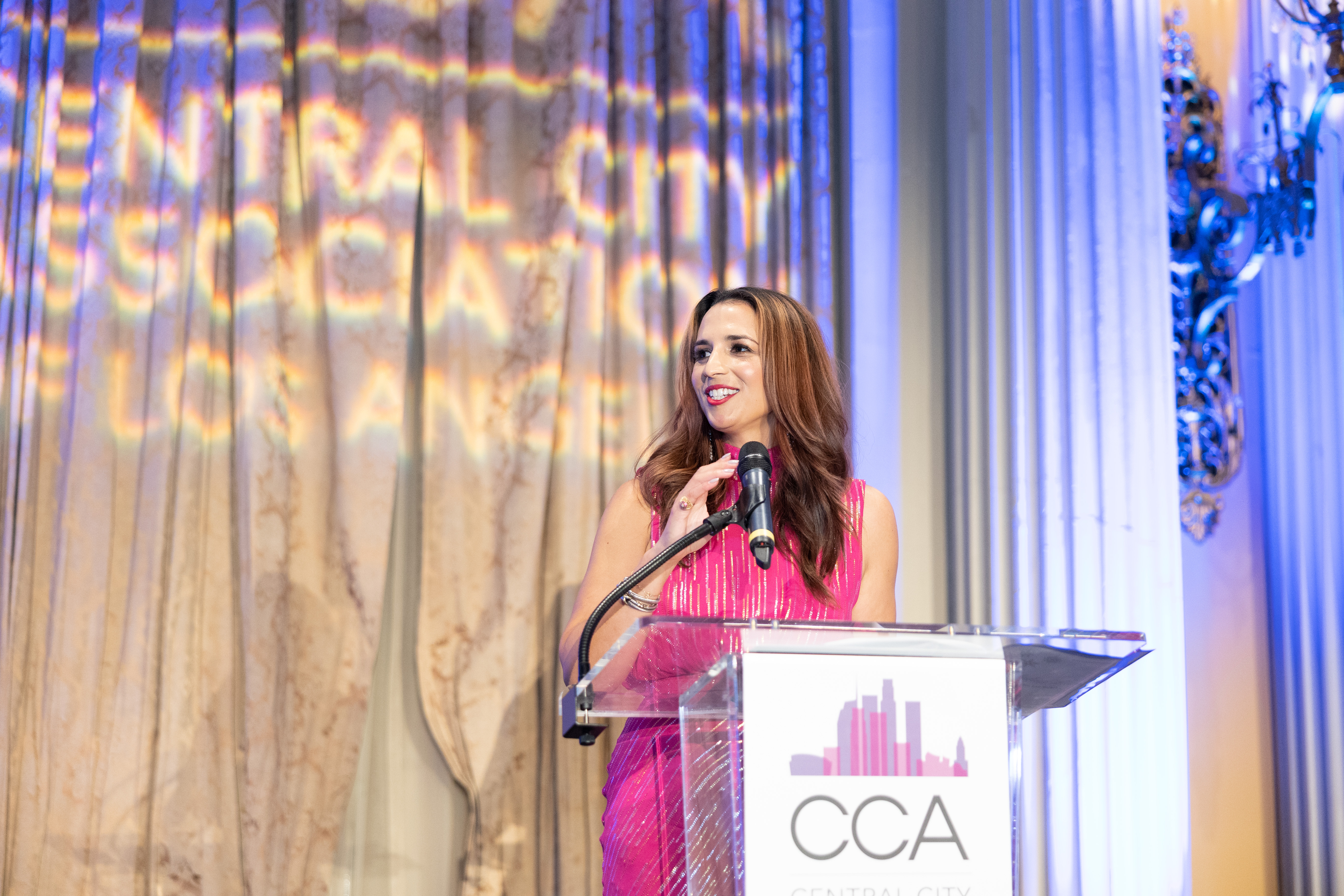Starting in January, Jessica Lall will become the new managing director of CBRE’s Downtown Los Angeles office after six years as the President and CEO of the Central City Association of Los Angeles. In this interview, TPR asked the outgoing CCA executive about Downtown LA’s pandemic recovery, its challenges and opportunities, and how she expects new leadership to shape the city’s vibrant center.

“ [DTLA2040] Plan is not just critical for downtown; it's critical for our city and our region”; “There's this notion of can we go back to normal? I don't think there's ever going back. We have to evolve in a new way that maybe we didn't perceive in 2018 or 2019, but I think that's what's exciting.” -Jessica Lall
Jessica, you join us for this TPR exit interview after six years as President and CEO of the Central City Association of Los Angeles, including a tenure through the pandemic when much of downtown was shut down and, two years in, still continues with the challenges of recovery. Assess for our readers your tenure at CCA—the accomplishments you're most proud of and the lessons learned.
It's been a roller coaster, with really high and low points. I think as far as CCA is concerned, I really came in with the vision of diversifying and strengthening the Board and the Coalition. I'm proud to say we did both.
Our membership boasts about 30 percent nonprofit organizations. We've evolved from simply a business advocacy organization to a civic advocacy organization, which has ultimately made our policy suggestions and agenda far more powerful, robust, and substantive in terms of presenting workable solutions for our City and County leaders.
We've seen a growth in nonprofit, civic, tech, and sports, in particular. We've also bridged the public and private sectors in the areas of housing, homelessness, and public safety. We’ve been a place where we've taken best practices and synthesized a more nuanced approach, which I think has been reflected and adopted in many areas.
For example, we supported legislation and initiatives like SB 679, which created our regional approach to affordable housing, and the CIRCLE program, which is an unarmed response model for public safety and mental health services in Downtown. I'm also really proud of our balanced approach on civic projects like the Downtown Community Plan DTLA 2040, which we're still eager to get over the finish line.
The other thing that I think we did in a critical moment was we grew and expanded our Political Action Committee. We increased civic engagement overall and were a convener and educator, not just to our members, but to the public. To be able to evaluate candidates in a more thoughtful way beyond the sound bites. We relaunched Downtown Works, CCA’s 501c3 sister organization that works to increase awareness and engagement on the opportunities and challenges in Downtown. At CCA, we’ve been putting out thought leadership and white papers, synthesizing information, and presenting to city leaders on things like micro-units, adaptive reuse, affordable housing, RHNA goals, you name it.
I think the culmination of that work has brought forward an evolved CCA. One that really is needed in the times that we're in; one that is going to continue to be more needed as we see so many new faces, which is a great thing, on our City Council and in City Hall. We need to make sure that we have that institutional knowledge, those collaborators, and that coordination as a place to convene people and ideas.
CCA White Paper "Building Affordable Housing at Scale"
Jessica, elaborate on the challenges faced by LA & governance in the last few years; the status of DTLA’s ambition to become a true and significant center for Los Angeles; and, your views on how to achieve LA’s & CCA’s goals.
Los Angeles is a complex metropolis. It brings opportunities, but it also comes with the challenges of geography and diffused power, which I think has led to a lot of the issues that we've seen.
We've seen so many legal scandals at City Hall over the last few years that have crippled our ability to get things done, along with our reputation as a place that isn't friendly for business, an affordability crisis, and a homelessness crisis. I think some of that is inherent to what cities are grappling with across the country. COVID, though, hit us in a particularly challenging way because it put a bright spotlight on many of those issues. We are still coming to terms on how we address it.
I think the leaked audio tapes were a very eye-opening moment. I think a lot of us know we have issues with redistricting, power, and representation. I'm hoping that out of all of this comes real reform and a more active and engaged citizenry, which I think we're still in the middle of.
I'm hopeful overall. I still think the optimism, hope, our educational institutions, and the diversity of industry, people, and thought—everything—all the assets that we need to overcome these challenges are here and present. We just need leadership, and leadership working together across sectors, to bring forward solutions.
We can't be in this “either/or” mentality that has crippled us. We need to be operating in a more nuanced way that allows for everyone to have a seat at a table and everyone to leave partially satisfied and partially dissatisfied, as the art of compromise goes.
I am hoping that with new leadership, we're going to see some of these problems that are systemic and really in need of governance reform take shape. That's my hope for LA.
Give us a status update on DTLA so our readers who haven't visited downtown in years have a view of the new normal: the economy, environment, housing market, and street-life.
You know, when I started at CCA, Downtown was absolutely hitting its stride. There were 800 new bars and restaurants; housing units coming online; people of all backgrounds moving in.
The pandemic definitely challenged that way of life in a downtown environment. Being out in the neighborhood, as the asset, was taken off the plate for people. Downtown is the regional jobs hub. With work from home, people weren't coming into offices, and small businesses were suffering. There's a sort of a cascading effect there for sure.
I think we're in a transition and we're coming back. The great thing about downtown is that we are resilient. Downtowns come back and adapt faster. We have the inherent assets.
If you look at WayMo, for example—the self-driving tech company—they chose Downtown LA to open up their new innovation hub. That's a great sign.
We're still the region's transit hub. We have talked a lot about what is the future of mass transit. I still think that that's being worked out, but the Regional Connector is going to be opening and provide access to the cultural institutions like the Broad, Colburn, MOCA, and the Disney Concert Hall. Major sporting events are going to continue to anchor Downtown with visitors like the World Cup and the Olympics. We're also finally seeing the Convention Center project take form.
We cannot forget the housing crisis. Downtown LA is 1 percent of the land but expected to be 20 percent of the city’s future housing growth . By far and away, it has an outsized role to play in terms of providing housing for all types of individuals.
We are, though, still challenged with public safety and homelessness issues that have been plaguing Downtown. We have not really had effective representation from our council members, starting with Councilmember Huizar, a pandemic, and now we’ve seen our current representative not be able to represent the district.
We’ve been dealing with challenges far before the pandemic and these issues compound the impacts of the pandemic. There is the fact that we are still doing so well despite these massive challenges. If we could just get out of our way just a little bit, we could fully unleash the potential that Downtown has to offer.
There’s this notion of, can we go back to normal? I don’t think we’re ever going back. We have to evolve in a new way that maybe we didn’t perceive in 2018 or 2019, but I think that’s what’s exciting. I think the commitment from the right people and these investments that were made years ago coming to fruition are going to help accelerate that recovery.
Elaborate on the consequences of the City Council’s delay in adopting the Downtown Community Plan, DTLA 2040. Pair that with the comments you made in an interview with us in 2019 where you said, “CD14’s next council member must champion Downtown as a civic, cultural, and economic heart of LA.” Pair those two together in any order you want.
Oh my gosh, that is the question. Just to provide context; when I started as head of the South Park BID almost 10 years ago, we were talking about the 2040 plan.
The challenges that we've seen with the issues around Councilman Huizar and others—where there's corruption from bypassing a public process—is exactly what community plans, when they're in place and updated, can overcome. Plans provide clarity to folks about what they can develop. It takes more of the subjectivity out of the process.
I think everybody wants to see this plan move forward, but we're stuck. We just wrote an op-ed about the consequences of this. I'm worried that the EIR will become stale, and we will not be able to move this plan forward and will have to start over.
I think we're hopeful that we can work with other members of the City Council. We just submitted a couple of letters to the Head of PLUM and our new Council President to make the case that this plan is not just critical for downtown; it's critical for our city and our region. Downtown is the economic hub. So goes downtown, so goes the rest of the region. Therefore, there should be a more global perspective and attention to this plan to get it done.
I'm hopeful, but it's going to take all of us really keeping the pressure on and making sure that we can get something passed. For our new mayor, doubling down on that commitment to get these plans done as we talk about large-scale charter reform is really needed so communities are not paralyzed should they have a council member who can't operate, which unfortunately has been our situation now for far too long.
Draw on your personal experience of throwing your hat in the ring in 2021 to be the Mayor of LA; and, share your thoughts on how the new mayor, Karen Bass, could best achieve her goals.
That was a wild experience, and I'm very glad I did it.
I'm excited to see a glass ceiling shattered by Mayor Bass. When I got into that race, I got in with very clear ideas for how to solve problems. They were not my ideas, but ideas from people that I have the privilege of working with in my job at CCA and from my time in Mayor Villaraigosa’s office.
I think it is to the disservice of candidates how little discussion there is about substantive ideas. It's all about how much money you can raise. I think far more often, we're slinging mud.
As a first-time candidate, I was on the phone six days a week, eight hours a day, raising money. There was one week in January where we got to really focus on homelessness solutions, and I'm very proud of the ideas that we put out. Many were adopted later by other candidates. It was this one moment where I got to actually talk to people about solving problems. I also think we really have to change the way we finance campaigns if we're going to see more diversity and people seeking office.
I think our new mayor has hit the ground running. A three-and-a-half-week transition is insane for the second largest city in America. I thought it was smart for her to ask people to stay on for a few more months while she takes her time to get the right people in the right positions at City Hall. I think she's clearly focusing on homelessness in her first 100 days, which I think is going to be the barometer for how the public judges her early on. I think her priorities are in the right place.
She's making smart hires and having people who know the building and who can work. They’re on all sides of the political spectrum when you look at the makeup of the council. That is going to be extremely important. She's already looking to leverage her federal connections and those in the state, which I think LA needs more resources from just beyond our city.
She's got her hands full. I think regardless of where any of us were in this race, we all have to be committed to her success. Her success is all of our success, and the task is daunting. The stakes, I would say, have never really been higher for our city and the opportunities that exist.
There's an insightful and well written piece in the UCLA publication, Blueprint, edited by former LA Times editor, Jim Newton and written by Jon Regardie, titled The Candidates for L.A. Mayor. It offers a nuanced, under-reported viewpoint re how much commonality existed between the two Mayoral finalists and the search for policy answers that work. Given that you have been, as a candidate, in the belly of the beast; talk about how difficult it is to create the civic conversations that allow candidates to govern–to be effective leaders.
Well, this is why I think what you guys do at The Planning Report is so important. The way people consume news and information now is in such an echo chamber.
It's going to be interesting to watch some of our newly-elected officials, who have never been in office before and who ran with a very distinct constituency, how willing they are going to be to work with others and sit at the same table. We have to be willing to do that.
At CCA, we invite everyone to participate whether or not we think we're going to get along or agree. It's about being able to work together. I think sometimes we've gotten to the place where it's seen as weakness if we work or talk to someone who doesn't agree with us. That is not governing or democracy.
I think our Mayor has a history of being able to bring people together and sit people at the table to have these hard conversations. I'm hoping we're going to see our Councilmembers and the other city electeds rise to the occasion and demand more from their constituents to be willing to participate and not to sit in our own little echo chambers, agreeing with only people we want to agree with. We'll agree on some things, and we'll disagree on others. We're not all the same and nor should we be.
You've recently announced that you're professionally transitioning from CCA to CBRE to work alongside Lew Horne in LA. Elaborate on your choice and what you hope to accomplish there.
I've had the honor of working with Lew and the CBRE team in my role at CCA. I met Lew when I was applying to become a City Hall fellow back in the Villaraigosa days. His company was one of the people who funded that fellowship. It's funny how things can come full circle.
Lew and I really first started to work together on homeless solutions before the pandemic. I was moved by seeing, in action, what a private sector company with the resources and expertise that they have brought to bear on issues that affect us all.
When you think about a company like CBRE, they are creating spaces that we operate in. They're helping shape the built environment, the office environment, and the residential environment.
As time drew on, I've talked about how LA needs business and civic leaders, people who work in companies who are committed to the city and committed to bringing their resources as part of solutions for the benefit of all of us. I think Lew is one of those people.
I'm really looking forward to moving to a different spoke on the wheel. We all want to grow and expand our own professional horizons. This is going to be an exciting opportunity, and I'm not sure fully what to expect in some ways. It's going to be very different, but I think in many ways, when you are working with the same values and intentions and vision, it can be very powerful. I am so excited to join the team in January.
CCA has announced your successor, Nella McOsker. Assuming you leave a note in her drawer with some advice—what might it say?
I'm so excited for Nella. As you know, she was our Vice President of Strategic Relations. When I started at CCA, Nella was actually working at the firm that we had hired to help run CCA’s strategic planning process. She's got a lot of history and experience with CCA.
What I've learned on this job that I would share with her is patience and that incremental change is change. Do not be discouraged if things don't happen as fast as you would want them to happen. You have to push with that sense of urgency and sense of commitment, but sometimes you have to reframe what is a win when it actually happens. That is something that I've taken away from CCA that maybe I didn't have coming into the job. It would also be to feel proud of those baby steps, because that's ultimately how we get to a new and better place.
- Log in to post comments






